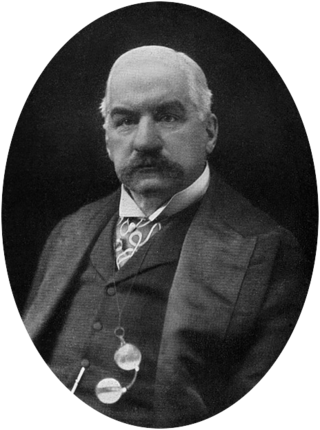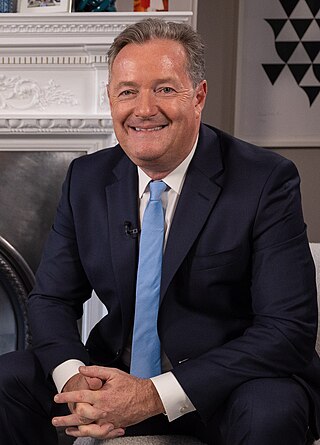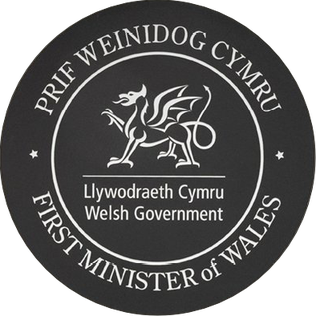First Morgan government may refer to:
- Eluned Morgan government, formed 2024
- First Rhodri Morgan government, 2000–2003
First Morgan government may refer to:

Morgan Freeman is an American actor, producer, and narrator. Throughout a career spanning five decades, he has received numerous accolades, including an Academy Award, a Golden Globe Award, and a Screen Actors Guild Award as well as a nomination for a Tony Award. He was honored with the Kennedy Center Honor in 2008, an AFI Life Achievement Award in 2011, the Cecil B. DeMille Award in 2012, and Screen Actors Guild Life Achievement Award in 2018. He is widely regarded as one of the greatest actors of all time.

Morgan Stanley is an American multinational investment bank and financial services company headquartered at 1585 Broadway in Midtown Manhattan, New York City. With offices in 41 countries and more than 75,000 employees, the firm's clients include corporations, governments, institutions, and individuals. Morgan Stanley ranked No. 61 in the 2023 Fortune 500 list of the largest United States corporations by total revenue and in the same year ranked #30 in Forbes Global 2000.

John Pierpont Morgan was an American financier and investment banker who dominated corporate finance on Wall Street throughout the Gilded Age and Progressive Era. As the head of the banking firm that ultimately became known as J.P. Morgan and Co., he was a driving force behind the wave of industrial consolidations in the United States at the turn of the twentieth century.

Hywel Rhodri Morgan was a Welsh Labour politician who was the First Minister of Wales and the Leader of Welsh Labour from 2000 to 2009. He was also the Assembly Member for Cardiff West from 1999 to 2011 and the Member of Parliament for Cardiff West from 1987 to 2001. He remains the longest-serving First Minister of Wales, having served in the position for 9 years and 304 days. He was Chancellor of Swansea University from 2011 until his death in 2017.

JPMorgan Chase & Co. is an American multinational finance company headquartered in New York City and incorporated in Delaware. It is the largest bank in the United States and the world's largest bank by market capitalization as of 2023. As the largest of Big Four banks, the firm is considered systemically important by the Financial Stability Board. Its size and scale have often led to enhanced regulatory oversight as well as the maintenance of an internal "Fortress Balance Sheet". The firm is temporarily headquartered at 383 Madison Avenue in Midtown Manhattan and is set to move back across the street into the under-construction JPMorgan Chase Building at 270 Park Avenue in 2025.

Julie Morgan is a Welsh Labour Party politician, who has been a Member of the Senedd for Cardiff North seat in the Senedd since the 2011 election. She was previously Member of Parliament (MP) for Cardiff North from 1997 until 2010.

Piers Stefan Pughe-Morgan is an English broadcaster, journalist, writer, and media personality. He began his career in 1988 at the tabloid The Sun. In 1994, at the age of 29, he was appointed editor of the News of the World by Rupert Murdoch, which made him the youngest editor of a British national newspaper in more than half a century. From 1995, Morgan edited the Daily Mirror, but was fired in 2004. He was the editorial director of First News from 2006 to 2007. In 2014, Morgan became the first editor-at-large of the MailOnline website's US operation.

The first minister of Wales is the leader of the Welsh Government and keeper of the Welsh Seal. The first minister chairs the Welsh Cabinet and is primarily responsible for the formulation, development and presentation of Welsh Government policy. Additional functions of the first minister include promoting and representing Wales in an official capacity, at home and abroad, and responsibility for constitutional affairs, as they relate to devolution and the Welsh Government.

Morgan Valentine Spurlock was an American documentary filmmaker, writer, and television producer. He directed 23 films and was the producer of nearly 70 films throughout his career. Spurlock received acclaim for directing the documentary Super Size Me (2004), which was nominated for the Academy Award for Best Documentary Feature Film. He produced What Would Jesus Buy? (2007) and directed Where in the World Is Osama bin Laden? (2008), POM Wonderful Presents: The Greatest Movie Ever Sold (2011), Comic-Con Episode IV: A Fan's Hope (2011), and One Direction: This Is Us (2013).

Mair Eluned Morgan, Baroness Morgan of Ely,, is a Welsh Labour politician who has served as First Minister of Wales and Leader of Welsh Labour since 2024. She previously served as Cabinet Secretary for Health and Social Care in the Welsh Government from 2021 to 2024.

Seether are a South African rock band founded in 1999 in Pretoria, Gauteng. The band originally performed under the name Saron Gas until 2002, when they moved to the United States and changed it to Seether to avoid confusion with the deadly chemical known as sarin gas. Lead vocalist and guitarist Shaun Morgan is the band's longest serving member, bassist Dale Stewart joined shortly after formation while drummer John Humphrey joined them for the band's second album. Since 2018, the band has been employing second guitarist Corey Lowery. Several notable guitarists like Corey's brother Clint and Troy McLawhorn have toured or recorded with the band, however, Morgan has recorded most guitar parts for the band's records.
J.P. Morgan & Co. is an American financial institution specialized in investment banking, asset management and private banking founded by financier J. P. Morgan in 1871. Through a series of mergers and acquisitions, the company is now a subsidiary of JPMorgan Chase, one of the largest banking institutions in the world. The company has been historically referred to as the "House of Morgan" or simply Morgan.

Loretta Lynn Morgan is an American country music singer and actress. She is the daughter of George Morgan, widow of Keith Whitley, and ex-wife of Jon Randall and Sammy Kershaw, all of whom are also country music singers. Morgan has been active as a singer since the age of 13, and charted her first single in 1979. She achieved her greatest success between 1988 and 1999, recording for RCA Records and the defunct BNA Records. Her first two RCA albums and her BNA album Watch Me are all certified platinum by the Recording Industry Association of America (RIAA). The 1995 compilation Reflections: Greatest Hits is her best-selling album with a double-platinum certification; War Paint, Greater Need, and Shakin' Things Up, also on BNA, are certified gold.

Craig Morgan Greer is an American country music artist. A veteran of the United States Army as a forward observer and current member of the United States Army Reserve, Morgan began his musical career in 2000 on Atlantic Records, releasing his self-titled debut album for that label before the closure of its Nashville division in 2000. In 2002, Morgan signed to the independent Broken Bow Records, on which he released three studio albums: 2003's I Love It, 2005's My Kind of Livin', and 2006's Little Bit of Life. These produced several chart hits, including "That's What I Love About Sunday", which spent four weeks at the top of the Billboard country charts while also holding the No. 1 position on that year's Billboard Year-End chart for the country format. A greatest hits package followed in mid-2008 before Morgan signed to BNA Records and released That's Why later that same year. After exiting BNA, Morgan signed with Black River Entertainment and released This Ole Boy in 2012, followed by A Whole Lot More to Me in 2016.

Jeffrey Dean Morgan is an American actor. He is best known for playing the character Negan in the AMC horror drama series The Walking Dead (2016–2022) and its spin-off The Walking Dead: Dead City (2023–present), for both of which he has received critical acclaim. He has also appeared in television roles such as John Winchester in the CW fantasy horror series Supernatural, Denny Duquette in the ABC medical drama series Grey's Anatomy (2006–2009), Jason Crouse in the CBS political drama series The Good Wife (2015–2016), as well as film roles including William Gallagher in P.S. I Love You (2007), the Comedian in the superhero film Watchmen (2009), Clay in The Losers (2010), Sgt. Maj Andrew Tanner in Red Dawn (2012), and Agent Harvey Russell in Rampage (2018).
Robert or Rob Morgan may refer to:

Morgan Richard Tsvangirai was a Zimbabwean politician who was Prime Minister of Zimbabwe from 2009 to 2013. He was president of the Movement for Democratic Change, and later the Movement for Democratic Change – Tsvangirai (MDC–T), and a key figure in the opposition to former president Robert Mugabe.

Nicola Ann Morgan, Baroness Morgan of Cotes, is a British politician who served as Secretary of State for Education and Minister for Women and Equalities from 2014 to 2016 and Secretary of State for Digital, Culture, Media and Sport from 2019 to 2020. She was the first woman to chair the Treasury Select Committee. A member of the Conservative Party, she was Member of Parliament (MP) for Loughborough from 2010 to 2019.

Nick Morgan is an American speaking coach and author.

Morgan Cole Wallen is an American country pop singer. He competed in the sixth season of The Voice, originally as a member of Usher's team, but later as a member of Adam Levine's team. After being eliminated in the playoffs of that season, he signed to Panacea Records, releasing his debut EP, Stand Alone, in 2015.